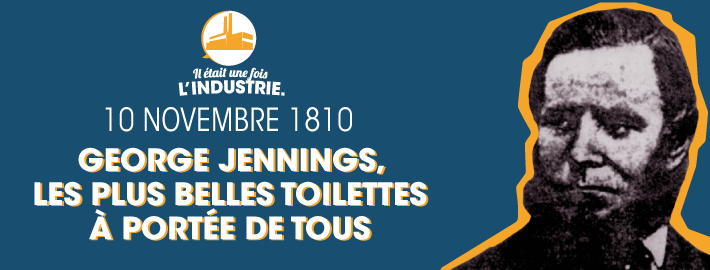GLOBAL
INDUSTRIE
News
Share on

10 November 1810: George Jennings, the finest toilets available to everyone
This week marks the anniversary of the birth of a certain George Jennings. Although this name probably means nothing to you, we all owe a debt of gratitude to this English engineer, since he is none other than the inventor of… public flush toilets.
A MIND SWIRLING WITH IDEAS
Josiah George Jennings was thus born on the 10th of November 1810 in Eling, Hampshire. The oldest of seven children, he started work upon the death of his father when he was only 14 and ended up joining his uncle’s plumbing company. Although he did not stay there for long, his future was now in the pipeline. In 1838, taking advantage of a nest egg left to him by his grandmother, he created his own company.
Particularly ingenious and inventive and his mind swirling with ideas, Jennings specialized in designing toilets while at the same time working on large-scale sanitation projects such as the development of underground “public conveniences”, accessed through metal barriers, whose interior, paved with slate and then ceramic tiles, was lit by lamps.
In 1847, he was decorated by Prince Albert himself, the husband of Queen Victoria, for his "India rubber taps and tubes" which facilitated Britain’s water supply. His company, which was now called the George Jennings South Western Pottery, located in Dorset, continued to flourish and possessed its own steam locomotive which ran on a private line.
PRIVY TO STATE AFFAIRS
Recognition came at the time of the great international industrial exhibition organized in Hyde Park from the 1st of May to the 15th of October 1851. For the occasion, he presented and installed his "Monkey Closets" at Crystal Palace, which were quite simply the first public toilets.
They were popular to say the least, enjoying a flush of success which swept away everything in its path. In a little under six months, 827,280 visitors paid one penny for the privilege of testing them! For this modest fee, which made the finest toilets available to people of all means, they benefited from a clean seat, a towel, a comb and shoe polish. This was the origin of the English expression "to spend a penny", commonly meaning to go to the bathroom. The success was such that, instead of being closed at the end of the exhibition as was initially planned, the famous conveniences ended up staying open and bringing in more than £1,000 per year.
George Jennings also enjoyed a certain reputation in the public sphere. Thus, in 1855, during the Crimean War, he was the person chosen to head the sanitary commission sent by the British government to improve living conditions at Scutari Barrack Hospital in Istanbul, at the request of the famous nurse Florence Nightingale.
Although this father of fifteen children – by two marriages – died on the 17th of April 1882, at the age of 72, following an unfortunate carriage accident which had left him with a broken collar bone, his company was to continue until 1967. It installed his famous invention in numerous cities around the globe, from Europe (Paris, Florence, Berlin, Madrid, etc.) to South America and the Far East, by way of Sydney in Australia. It also supplied toilets to numerous railway companies around the world.
"I grew up with six brothers. That’s how I learned to dance... waiting for the bathroom!"
– Bob Hope
OTHER EVENTS WHICH HAPPENED THIS WEEK:
- 8 November (1895): Wilhelm Röntgen discovers X-rays
- 8 November (1957): first British H bomb test
- 9 November (2005): launch of the Venus Express probe by the European Space Agency
- 10 November (1887): birth of the Romanian engineer Elisa Leonida
- 10 November (1888): birth of the Soviet aeronautical engineer Andreï Tupolev
- 10 November (1963): death of Klára Dán von Neumann, one of the first female computer engineers
- 11 November (1946): first flight of the SO.6000 Triton, the first French jet aircraft
- 11 November (1982): first mission of the American space shuttle Columbia
- 12 November (1746): birth of the French chemist Jacques Charles, the first man to fly a hydrogen balloon
- 12 November (1895): founding of the Automobile Club of France
- 12 November (1906): the Brazilian aviation pioneer Alberto Santos-Dumont makes an experimental flight in his plane in the Bois de Boulogne
- 13 November (1971): the Mariner 9 probe is placed in orbit around Mars
- 14 November (1908): invention of cellophane by the Swiss chemist Jacques Brandenberger
2021.11.08